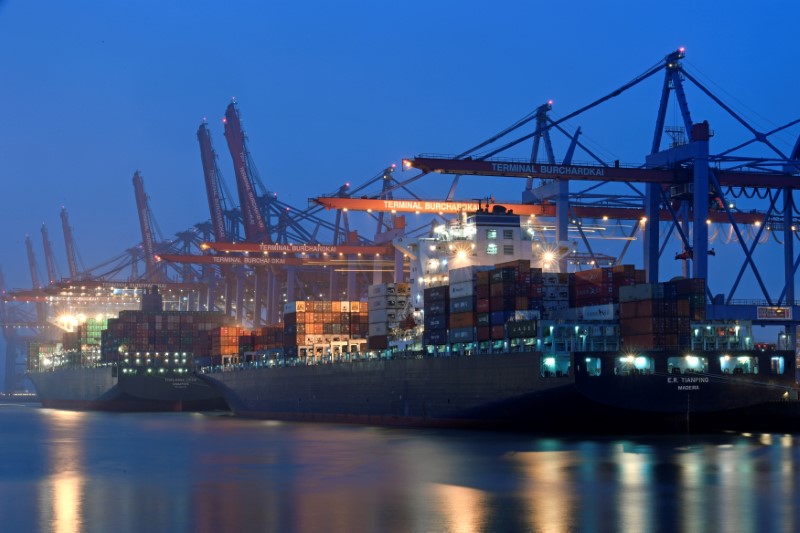By Michael Nienaber
BERLIN (Reuters) - German exports rose more strongly than expected in May, outpacing a solid increase in imports and widening the trade surplus of Europe's biggest economy, data showed on Monday.
The surprisingly strong trade figures, released by the Federal Statistics Office, underline how the German economy is firing on all cylinders ahead of a Sept. 24 federal election in which Chancellor Angela Merkel is seeking a fourth term.
The data will also add fuel to the debate about Germany's export strength after the International Monetary Fund on Friday repeated its call for Berlin to increase investment as a way to boost imports, support the economic recovery in other countries and reduce its record trade surplus.
Seasonally adjusted exports climbed 1.4 percent - their fifth consecutive monthly increase - while imports rose 1.2 percent, the data from the Federal Statistics Office showed.
Both figures came in stronger than expected: A Reuters poll had pointed to exports edging up 0.3 percent and imports rising by 0.5 percent.
Demand for German goods from countries outside the EU rose the most, with exports to so-called third countries, which includes China, Japan and the United States, soaring 17.3 percent, a breakdown of unadjusted trade figures showed.
"The global economy is improving, which has a positive impact on the German export economy," VP Bank economist Thomas Gitzel said, pointing to especially strong demand for German machinery from markets overseas.
"While private consumption has been an important growth driver in the last few years, net exports are now giving additional stability," Gitzel added.
The seasonally adjusted trade surplus edged up to 20.3 billion euros from a revised 19.7 billion euros in April. The May reading was in line with the Reuters consensus forecast.
Germany's wider current account surplus, which measures the flow of goods, services and investments, rose to 17.3 billion euros after a revised 14.9 billion euros in April, unadjusted data showed.
"The trade balance is currently swelling, which will again lead to suspicions on the other side of the Atlantic," Gitzel said. "U.S. President Donald Trump will therefore continue his vehement criticism of the high German trade surplus."
The trade figures come on the heels of solid manufacturing data released on Friday which showed industrial output rose more than expected in May, boosting expectations that factories will support growth in the second quarter.
Analysts expect the German economy to pick up speed in the second quarter after expanding 0.6 percent in the first three months of the year.

The IMF has raised its growth forecast for the German economy to grow by 1.8 percent in 2017 in real terms, compared with its April forecast of 1.6 percent, citing soaring domestic demand and rebounding exports.